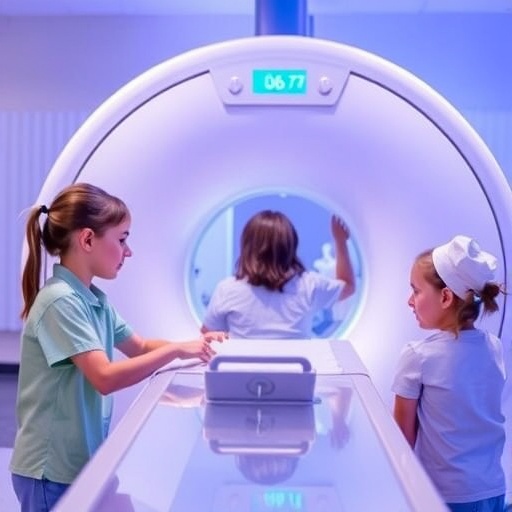In a groundbreaking study, researchers have ventured into an arena that holds immense relevance for pediatric care: the reduction of sedation during magnetic resonance imaging (MRI) procedures in children. The traditional reliance on sedation for this diagnostic tool has raised significant concerns among healthcare professionals regarding the potential risks involved, as well as the impact on both the child’s experience and hospital workflow. This study, spearheaded by Boriosi, Bryndzia, Lasarev, and a dedicated team, meticulously outlines an ambitious quality improvement project aimed at decreasing the necessity for sedation in pediatric MRI cases.
One of the highlights of this project is its focus on optimizing the MRI procedure itself, with the aim of creating an environment that is not only safe but also child-friendly. The researchers recognized that the anxiety often experienced by children within MRI machines could lead to a recommended sedation profile that exposes them to additional risks. By re-evaluating each aspect of the MRI experience, the team aimed to discover innovative strategies to alleviate this fear and discomfort without resorting to pharmacological solutions.
Crucial to their approach was the involvement of pediatric psychologists and specialists in child life programs. These experts contributed their unique insights to create an engaging and familial approach to the MRI process. By integrating techniques commonly used in play therapy, the goal was to foster a sense of security and calmness among young patients before, during, and after the imaging process. This multifaceted consideration of the child’s emotional state represented a significant departure from traditional methodologies.
The project commenced with a comprehensive assessment of the current challenges faced during MRI examinations in children. This analysis allowed researchers to pinpoint specific areas that frequently led to sedation, such as discomfort from the machine, anxiety about the loud noises, and the confinement of the scanning environment. Armed with this data, the team could formulate targeted interventions to mitigate these issues effectively.
One innovative strategy included the utilization of distraction techniques, leveraging multimedia aids that would captivate children’s attention and divert their focus from the procedure. For instance, the use of virtual reality headsets that allow children to engage in immersive environments during the scan has shown promising results in calming anxious young patients. This technology represents a frontier in modern pediatric care, shifting the perspective on how to approach what has traditionally been a stressful event.
Furthermore, the team implemented tailored pre-procedure preparation for both parents and children. This preparation period was instrumental in equipping families with the knowledge and reassurance they needed as they approached the MRI appointment. Parents learned techniques to prepare their children mentally and emotionally, thereby minimizing fears and misconceptions regarding the machine and the process.
An essential component of the team’s success lay in rigorous training of staff members who interacted directly with the pediatric patients. By establishing a standardized protocol that emphasized empathy, clear communication, and confidence, the trained personnel could create a more welcoming atmosphere around MRI procedures. This shift was shown to not only reduce anxiety levels but also streamline the workflow for healthcare professionals, making the overall experience smoother and more efficient.
Throughout the research, the statistics reflected a positive trend. As sedation rates declined, researchers gathered data on the overall satisfaction of the families involved. Feedback indicated that both children and parents felt more empowered and involved in the imaging process, a significant victory in pediatric healthcare. This newfound respect for the child’s perspective opened doors to better methods and protocols for handling sensitive medical procedures in the future.
Collaboration across different disciplines proved vital to the experiment’s success. Radiologists, pediatricians, child psychologists, and imaging technologists worked hand in hand to refine the agenda of reducing sedation while maintaining diagnostic accuracy. The results showcased the power of interdisciplinary approaches within healthcare settings, where the synergy of various expertise fosters more holistic solutions and outcomes.
Moreover, as public health discussions increasingly spotlight the importance of minimizing the use of sedatives, the findings of this study serve as an essential contribution to broader conversations about safety in pediatric medicine. The researchers highlighted how sedation can predispose children to potential long-term developmental outcomes, making a compelling case against its routine use in benign, albeit anxiety-inducing, procedures.
In conclusion, this quality improvement project is set to make waves in pediatric radiology. The proactive measures taken to reduce the reliance on sedation demonstrate a genuine commitment to enhancing patient care while ensuring that diagnostic processes are rooted in safety and compassion. With the success of this initiative, the research team hopes to inspire similar studies across various medical disciplines, thus paving the way for continued advancements in the field of pediatric healthcare.
Future studies will be needed to further validate these findings in diverse healthcare settings, but the potential implications for children’s health are profound. As hospitals and clinics around the world look to implement less invasive practices, the contributions of Boriosi, Bryndzia, Lasarev, and their colleagues signify a monumental step toward reshaping the pediatric diagnostic landscape.
Subject of Research: Reduction of MRI Sedation in Children
Article Title: A quality improvement project to reduce magnetic resonance imaging sedation in children.
Article References: Boriosi, J., Bryndzia, C., Lasarev, M. et al. A quality improvement project to reduce magnetic resonance imaging sedation in children. Pediatr Radiol (2025). https://doi.org/10.1007/s00247-025-06293-4
Image Credits: AI Generated
DOI: https://doi.org/10.1007/s00247-025-06293-4
Keywords: Pediatric MRI, Sedation Reduction, Quality Improvement, Child Psychology, Healthcare Innovations.




